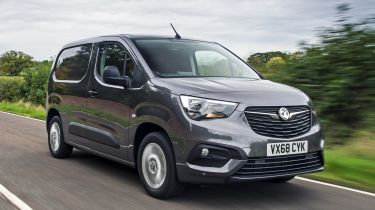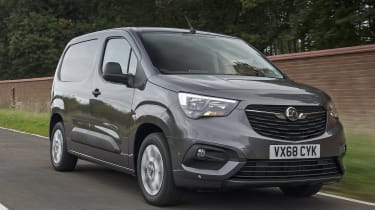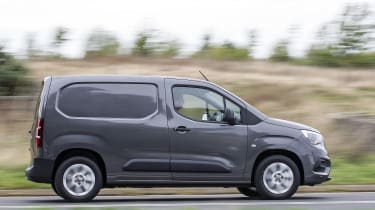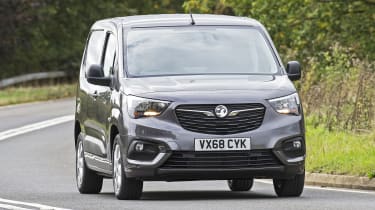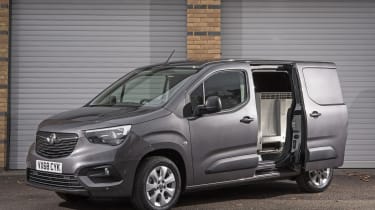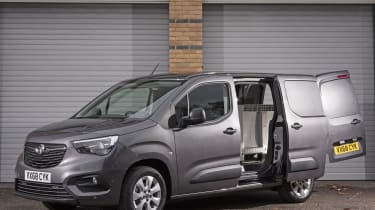Vauxhall Combo van review
The spacious and clever Vauxhall Combo is one of our current small van favourites
With its switch to PSA Group running gear, the Vauxhall Combo van is now a front-runner in the small van class. There are generous cargo weights in the back, easy access and plenty of useful load carrying options. On top of that, the cab is a comfortable place to spend time, and there's a raft of great safety kit available to make working life easier. On the road, the diesel engines deliver enough pulling power to keep pace with traffic, while the car-derived running gear means it feels good to drive, too. The Combo should definitely be on any small van buyer's shortlist.
Vauxhall has a long history when it comes to small vans. Cars like the Vauxhall Viva and Astra had their Bedford van counterparts, and when the commercial vehicles came under the Vauxhall brand, it continued to have a presence in the field. The Vauxhall Combo launched in 2018 is now into its fifth generation, and it's definitely the best version yet.
It was one of the first models from Vauxhall to be launched as part of the company's ownership by the PSA Group. It uses the same basic bodyshell and running gear as sister models from Peugeot and Citroen (and a fourth van from Toyota) and this means it's leaps and bounds better than the Mk4 Combo it replaced.
Used - available now

2023 Land Rover
Defender 90
8,047 milesAutomaticDiesel3.0L
Cash £61,960
2023 Mercedes
GLA
28,116 milesAutomaticDiesel2.0L
Cash £28,760
2022 BMW
X1
33,509 milesAutomaticPetrol2.0L
Cash £23,700
2022 BMW
3 Series
48,218 milesAutomaticDiesel3.0L
Cash £28,500The squarer body shape means there's good space inside, while a low floor makes access easy. Payloads have increased, too, and it's now possible to get up to one tonne of cargo in the back. Even more useful is a handy load indicator in the cargo area, which warns you if you are overloading the rear of the van.
The Vauxhall Combo comes in two lengths and one roof height (L1 H1 and L2 H1), and there's also a Crew Van based on the L2 H1 version. There are three trims available: Edition, Sportive and Limited Edition Nav. The basic Edition is designed to cater for fleet buyers, but is still pretty well equipped, while the Sportive and LE Nav vans bump up the kit count for smaller business users.
All vans come with heated electric door mirrors, electric windows and a single sliding side door as standard (it used to be cost option). The L2 version also adds a second sliding side door, while all variants feature offset double doors at the back. Safety kit includes a driver's airbag, auto lights, hill start assist and a full steel bulkhead.
Move up to Sportive trim and you get body coloured bumpers and wheel trims to smarten up the looks, while metallic paint is thrown in as a no-cost option. Inside, cruise control and air conditioning are added, as are a lidded glovebox and steering wheel controls for the audio system.
At the top of the range, LE Nav cars feature an 8-inch touchscreen navigation system, alloy wheels and more body coloured trim to give the van a more stylish look. In addition, the Crew Van version adds a second row of seats that can be folded and a steel mesh bulkhead that can slide back and forth to make more cargo room when the back seats aren't in use.
There are plenty of options offered, allowing you to upgrade the Combo to suit your needs. All option packs are available on all three models, too. The Parking Pack adds front and rear sensors, a rear camera and a nearside camera to give you a view of the van's blind spot. go for the Safety Pack and you add lane assist, traffic sign recognition, a tiredness alert and automatic emergency braking with forward collision alert.
Also available is the FlexCargo Pack, which turns the Combo into a three-seater. It also bumps up the versatility, with a load-through bulkhead and seats that flip and fold for different configurations. The Parking Pack adds front and rear parking sensors, plus a panoramic rear-view camera that can be switched permanently on to double as a rear-view mirror. Also included are side sensors and a nearside rear-facing camera that can help drivers detect objects in their blind spot.
Engines initially featured a 1.6 Turbo D badged either 75PS or 100PS, but this was replaced by a 1.5 Turbo D in the same outputs, while a 130PS version of this engine was available from launch. The 75PS and 100PS diesels both come with a five-speed manual gearbox, while the 130PS has a six-speed manual and an eight-speed auto option. Vauxhall offers the IntelliGrip Pack, which adds a switchable traction control system that can adjust settings to suit different surfaces.
If you need more grip, the Combo Cargo 4x4 is available. This features the 130PS diesel and comes in L1 or L2 body lengths and a ride height raised by up to 20mm, while the four-wheel-drive transmission is a system developed by French firm Dangel. The company has close ties with the PSA Group, having built Peugeot 4x4s in the past, but the Combo Cargo will be the only model to be offered as a 4x4 in the UK.
Also available - and a bit of a rarity in the small van market these days - is a 1.2 Turbo petrol engine. This is baged 110PS and features stop-start, but is only really recommended if you do plenty of urban miles with light payloads on board, and you really want to ditch diesel, but aren't prepared to make the switch to electric just yet.
On the road, the Vauxhall Combo feels good to drive. The car-derived platform delivers secure handling and good grip, while the driving position gives a good view of the road and your surroundings. The manual gearbox could do with a bit more of a positive shift, but overall the Combo is a comfortable van to drive.
The small van class is packed with rivals, chief among them being the Combo's sister models, the Citroen Berlingo Van, Peugeot Partner and Toyota Proace City. Beyond these three, there's the Ford Transit Connect, Renault Kangoo, Mercedes Citan, Volkswagen Caddy and Fiat Doblo. Thankfully, the Vauxhall Combo has a level of talent that means it can easily compete with all of them.
MPG, CO2 and Running Costs
Prices for the Vauxhall Combo start from around £18,500 for the L1 version, while the longer L2 model starts from around £20,500. The Crew Van is £1,000 more than the L2 it's based on, while the most expensive model is the L2 van in LE Nav trim at around £23,100. Those prices start slightly higher than for the Citroen Berlingo and Peugeot Partner, but the most expensive model comes in at less than these two.
Standard kit is reasonable, because you get electric windows, heated electric mirrors, a full steel bulkhead, sliding side door, six lashing eyes in the cargo area, a trip computer, central locking and a reach and rake adjustable steering wheel.
Move up to a Sportive model, and you get kit such as rear parking sensors, air conditioning and cruise control, while metallic paint is a no-cost option.
One thing that the Combo allows you to do is spec your van with as much or as little kit as you like, and even the entry-level Edition model can be upgraded with options. You can add a second sliding door to L1 vans (double sliding doors are standard on L2 vans and Crew Van variants), glazing for the doors, plywood or vinyl load floor coverings. Other convenience items include sat-nav, electronic climate control and even a head-up display. Vauxhall also offers packs to boost the Combo's load carrying and give it some off-road ability.
The diesel engine range offers good economy, and stop-start is fitted across the range. The 75PS Turbo D has best WLTP-tested fuel economy of 53.3mpg, but the more powerful 100PS version manages up to 54.3mpg. The powerful 130PS Turbo D records 50.4mpg, while adding the auto box pegs it back to 48.7mpg. These figures are the same for the L1 and L2 models, while the Crew Van with the 1.5 100PS Turbo D also has a recorded WLTP maximum of 54.3mpg. Go for the 1.2 Turbo petrol, and 51mpg is the best WLTP economy figure offered.
The Combo Cargo 4x4 only suffers a small impact on fuel economy thanks to the new transmission. The system is set up so that it automatically starts in front-drive mode when you start the van - you have to physically select 4WD via a dash-mounted control to engage the rear wheels.
Service intervals for the 1.2 Turbo petrol are annual or every 12,500 miles. We'd go for the 1.5 Turbo D if you want the lowest servicing costs, because there are two years or 25,000 miles between services.
Load Space and Practicality
The Vauxhall Combo uses a platform that combines the PSA Group's EMP2 chassis with the payload area of the last Berlingo and Partner vans. It's been tweaked here to make even more space, and there's a load volume of 3.3 cubic metres in the L1 version of the Combo. The L2 has a longer wheelbase and extended rear overhang to create a 3.9 cubic metre load volume. In comparison, the Crew Van has 3.5-4 cubic metres of space with the seats in place and folded.
The Combo's load height is 580mm on the L1 and 620mm on the L2, while load length is 1.78 metres, or 2.31 metres for the L2. Width between the wheelarches is 1.23 metres, and these dimensions mean there's enough room for two Europallets in the back of the Combo. And with the rear door openings measuring 1.24 metres by 1.19 metres, and the side door measuring 1.07 metres high, access to the cargo area is easy.
While the old Cargo only offered sliding side doors as an option, you now get one as standard on the L1 and a pair on the L2. The rear doors have a 60:40 split, while all doors can be glazed if you need it, and you can add a window to the steel bulkhead, too. Vauxhall also offers plywood or vinyl floor coverings to protect the load floor.
Add the FlexCargo system, and you get some useful extra features. There's a hole in the bulkhead and a fold-down front seat that allows you to load items that are 3.1 metres long (3.4 metres in the L2), while the front seat base also flips up - similar in style to Honda's Magic Seat layout, that creates an additional 500 litres of space in the front. You also get a cargo bag so that longer items that you load through don't mark or damage the van's interior. Finally, the FlexCargo system adds two seats to the cab, allowing you to travel three-up, although this seat layout can be a bit cramped for three adults.
Other useful features that are available include a roof flap (L1 models only) for longer items, while a trick Overload Indicator is offered, which lets you know when the van is near or exceeding its maximum gross vehicle weight.
The Combo Cargo 4x4 has an identical set of cargo bay dimensions and volumes, but the raised ride height means the load floor is higher. The ride height is 185mm in standard 4x4 guise, while adding the Plus Pack bumps this up by another 20mm to 205mm.
Reliability and Safety
The Vauxhall Combo uses the PSA Group's latest tech on board. It features EMP2 technology up front, which means Vauxhall has been able to offer a range of safety features that are more commonly seen on passenger cars. Standard safety kit includes a driver's airbag, a full-height steel bulkhead to separate the cargo and passenger areas, electronic stability control, traction control, hill start assist and emergency brake assist.
A passenger airbag is available as an option, as are side and curtain airbags. Tyre pressure monitors are also offered, while the Overload Indicator helps you know when you're reaching or exceeding the Combo's permissible payload weight.
Vauxhall also offers the Safety Pack, which adds a raft of safety kit that would have been unheard of on a van like this only a few years ago. The system uses a front camera system that means lane departure warning, speed limit recognition, forward collision alert and automatic emergency braking are all included. This Safety Pack costs around £700, and is a worthwhile addition to keep you safe on the road.
Van security includes remote central locking, an engine immobiliser, visible VIN plate and electronically protected audio equipment. On top of that, Sportive and LE Nav models get an alarm that monitors the cargo area and cabin. It also includes an alert showing if your van has suffered from an attempted break-in while the van has been left.
Reliability is something that will be looked at with keen interest with van buyers. A switch from a joint venture with Fiat for the last Combo to this new PSA Group model should see an improvement in reliability. The EMP2 platform has been around for a few years, so any bugs should've been ironed out, while the electrics are shared with a variety of other PSA Group models, too. The fact the Combo Cargo uses tried-and-tested running gear can only hold it in good stead.
It's a similar story with the Combo Cargo 4x4. Dangel is an experienced four-wheel-drive specialist with decades of knowledge in fitting drivetrains, while the components are all covered by the standard Combo Cargo warranty.
Driving and Performance
The 1.5 Turbo D 100 is expected to be the main seller in the range, and it's a decent performer. There's only a five-speed gearbox, but refinement at motorway speeds is acceptable. There's decent sound deadening around the cabin to keep wind and road noise low, and the engine is relatively new and used in a wide variety of models, and delivers good refinement once it's warmed up.
The engine is let down a little by the five-speed gearbox. There's not enough torque to let the engine take the strain, and changing gear is a bit vague - it's lacking the positive shift of some of its rivals. That's especially true when selecting reverse, which can occasionally need a couple of tries to engage.
The suspension soaks up bumps well to deliver a comfortable ride, although adding a heavy payload will add a harshness to the rear suspension over big bumps. Light steering helps with low-speed driving, while adding the optional parking aids and safety assistance systems means you'll be going some to have an accident in the Combo.
The Combo Cargo 4x4 is an impressive piece of kit off-road. The switchable 4WD does nothing to harm the van's on-road manners, while the extra suspension height seems to improve the ride a little, and there's less stress on the front tyres when exiting slippery junctions. With optional all-terrain tyres fitted, the 4x4 is almost as capable as many dedicated SUVs. The extra ride height helps to an extent – although it's still at greater risk of grounding than a pure 4x4, while standard hill descent control does a good job of keeping the van in check on downhill slopes. A diff lock is also offered for extremely slippery conditions, but you're more likely to avoid the roughest terrain before you need it.
Cab and Interior
The Combo has a thoroughly modern interior, although its links with the PSA Group are clear as day. While the Peugeot Partner sister model gets the company's 'dial-high' i-Cockpit layout, the only real differences between the Vauxhall and Citroen Berlingo Van are with the Combo's touch points. You get a steering wheel, gearlever and indicator stalks that are the same as those found in cars such as the Astra and Grandland X, while the trip computer and Intellilink sat-nav have dedicated Vauxhall graphics.
Move to the centre console, and the climate and radio controls are the same as you'll find in a Peugeot or Citroen, but that does mean the climate controls are slightly recessed under the air vents, making them a bit tricky to read and use.
The rest of the buttons are laid out reasonably well, while the steering wheel controls for the radio are arguably easier to use than the buttons themselves.
Space is good in the Combo, with rake and reach adjustment for the steering wheel helping you to get comfortable at the wheel. Big wing mirrors help with the view out, while the optional rear-view camera is a useful addition.
In two-seat mode the Combo has plenty of room for two, with no issues regarding head or elbow room. The driver's seat gets an armrest to boost comfort, too. Go for the FlexCargo pack, and the single passenger seat is replaced by a double seat. This will obviously be less roomy than a single seat, but the middle seat back folds down to create a table, while the outer seat folds down or flips up to create additional storage.
Elsewhere, there's overhead storage as standard, while dashtop trays and big door bins are fitted. There are two 12v sockets and two USB sockets in the cab, and an open tray in front of the passenger seat, but only Sportive and LE Nav cars get a glovebox. It's a pretty big one, though, with enough room for an A4 clipboard or even a laptop inside.
Van dimensions
| Body style | Height | Width | Length |
| L1 2000 short wheelbase van | 1,804mm | 1,848mm | 4,403mm |
| L1 2300 short wheelbase van | 1,804mm | 1,848mm | 4,403mm |
| L2 2000 long-wheelbase van | 1,837mm | 1,848mm | 4,753mm |
| L2 2300 long-wheelbase van | 1,837mm | 1,848mm | 4,753mm |
Load area dimensions
| Body style | Height | Width | Length | Volume |
| L1 short wheelbase van | 1,236mm | 1,630mm | 1,781mm | 3.3m3 |
| L2 long wheelbase van | 1,243mm | 1,630mm | 2,131mm | 3.9m3 |
| L2 long wheelbase crew van | 1,243mm | 1,527mm | 2,110mm | 4.0m3 |
| L1 with FlexCargo | 1,236mm | 1,630mm | 3,090mm | 3.8m3 |
(Width between wheel arches: 1,229mm)

